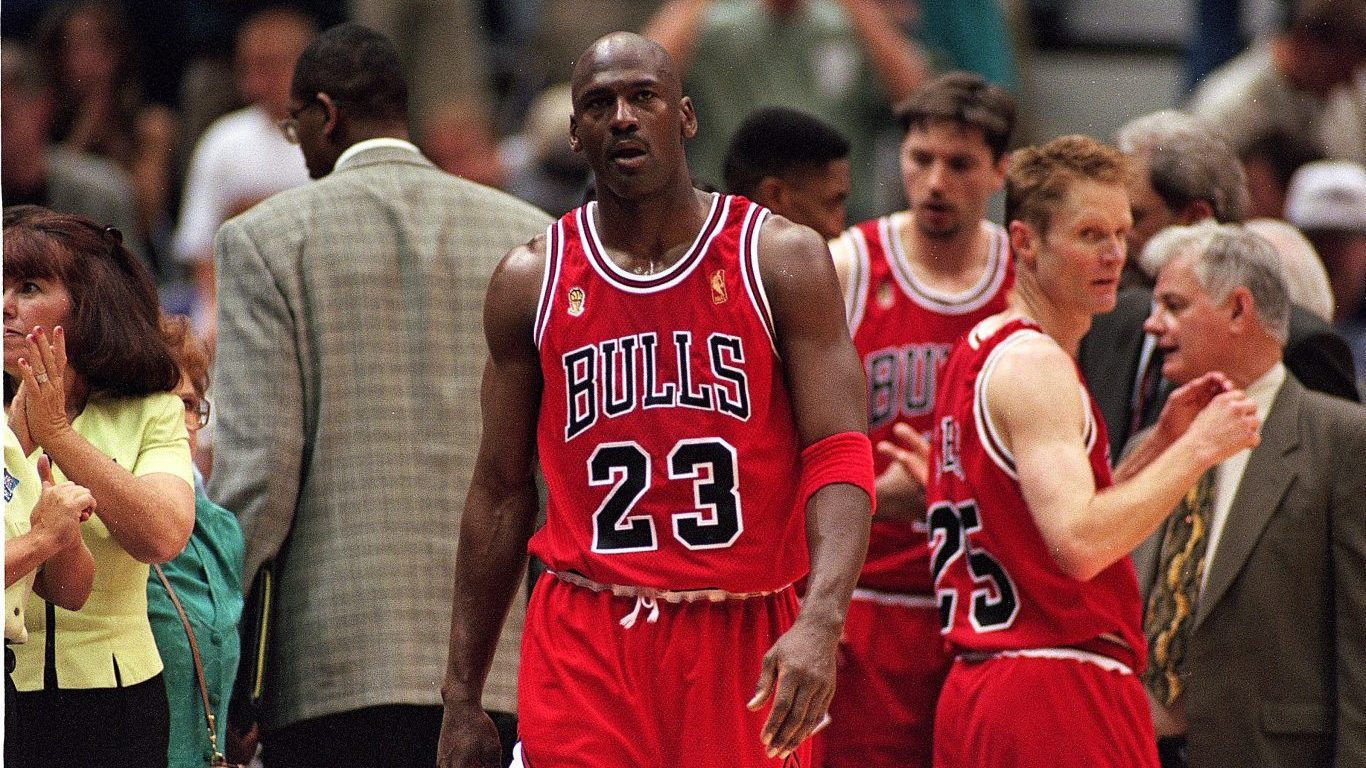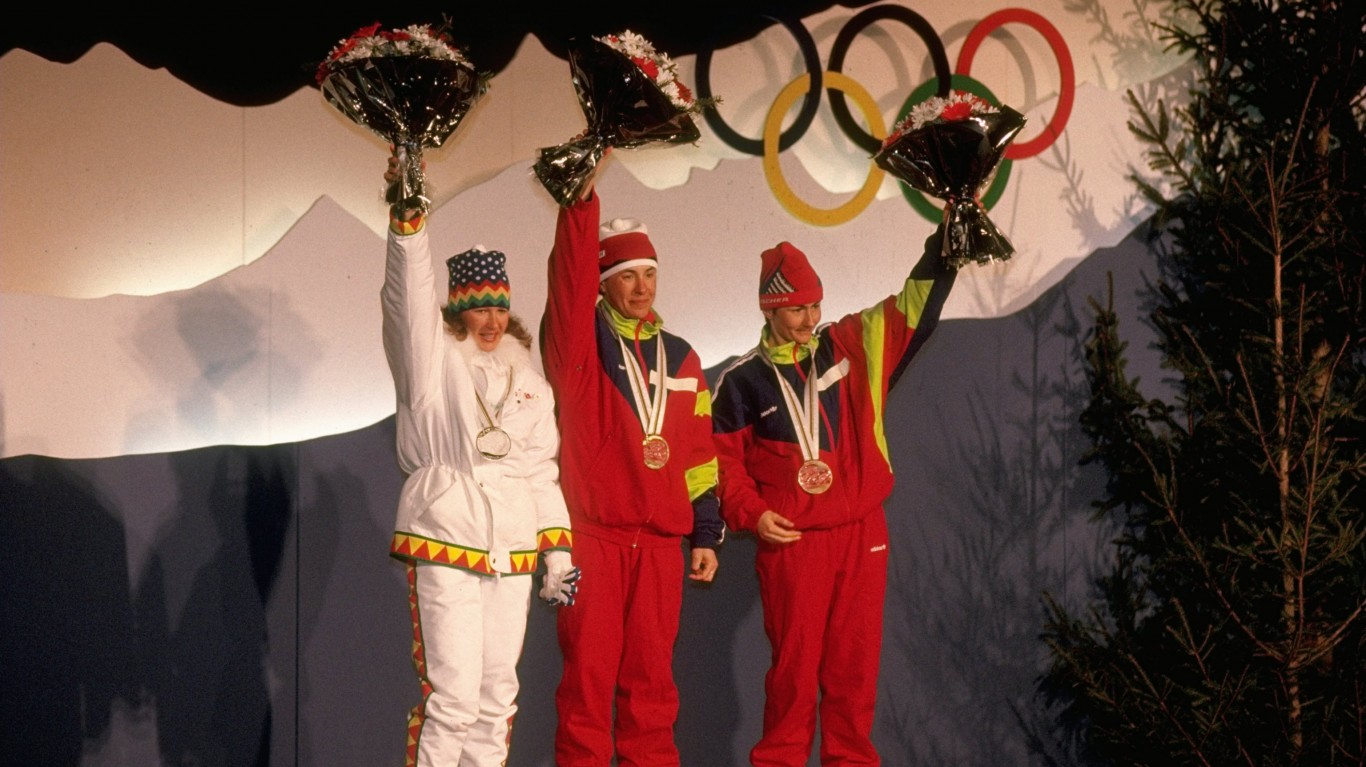
24/7 Insights
-
- The most memorable Olympic moments were also some of the most emotional.
- Some memorable Olympic moments also crossed social and political lines.
- At least a few Olympic moments have records that are hopefully never broken.
- Also: 2 Dividend Legends to Hold Forever
When you think about memorable moments in sports, some of the most notable have occurred during the Olympics. As the world’s most important sporting event, which occurs only every four years, the Olympics are often a once-in-a-lifetime opportunity to compete among the best in the world. As such, memorable moments and legendary performances are plentiful throughout Olympic history.
There are almost too many moments to count from watching Usain Bolt break every 100m record race, the 1992 Dream Team, or any of Michael Phelps’ world record races. Using multiple sources, including CNN, Reader’s Digest, and Reddit, we can list memorable moments in no particular order, even those that changed history for the better.
Why Is This Important?

As arguably the most important sports event in the world, the sponsors come out in force to get their brands front and center. From sponsoring athletes, transportation, clothes, and even food, there are many brands that 24/7 Wall St. covers involved in this year’s Olympics and those from previous years. On top of the brands, the Olympics brings in billions in revenue for the host city and the television networks that cover the games.
1. Jesse Owens
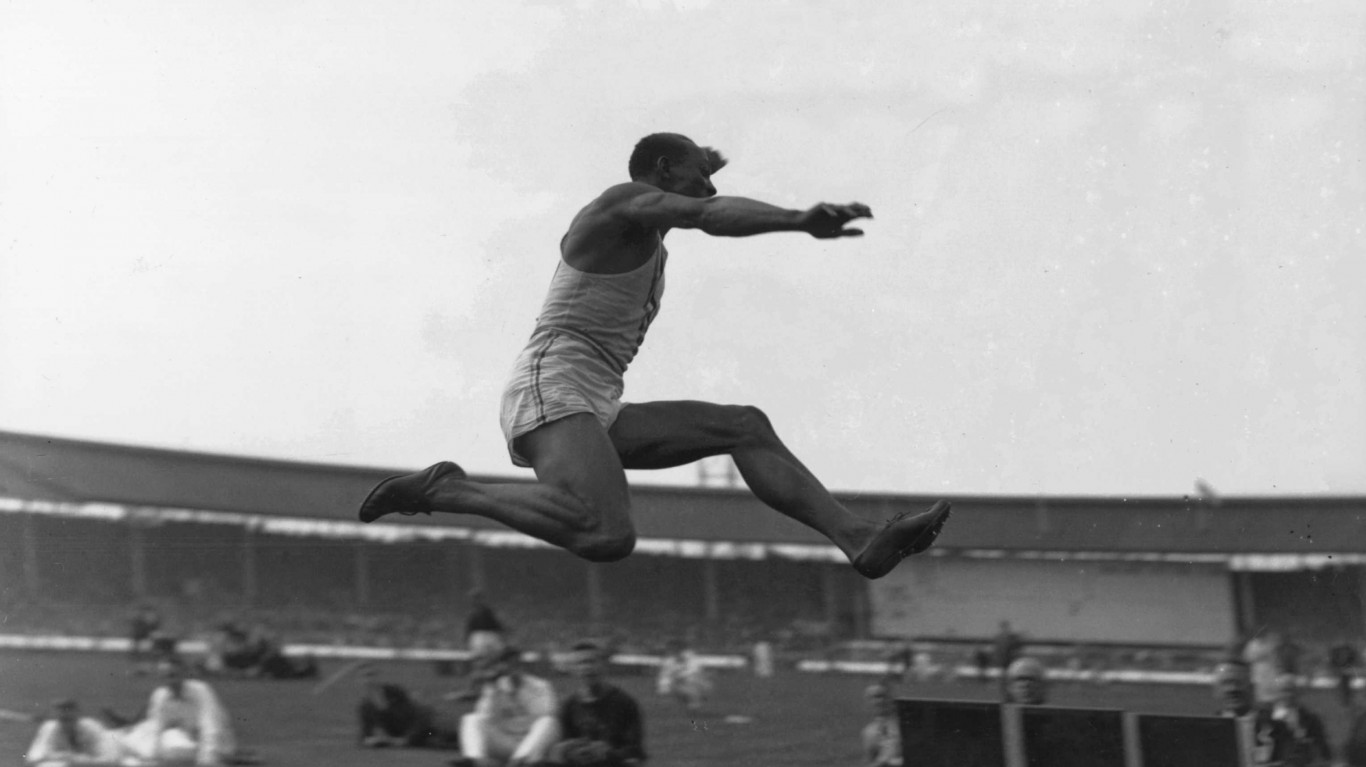
- Olympic games: Berlin 1936 (XI Olympiad)
One of the most important and memorable Olympic history moments came in 1936 with Jesse Owens. With the games taking place in Berlin, the Nazi agenda was on full display, including Germany’s aim to use these games as an opportunity to display the racial superiority of white athletes. However, Jesse Owens, a US track star, spoiled this idea and became a cultural icon after winning four medals at the 1936 games.
Track Superstar
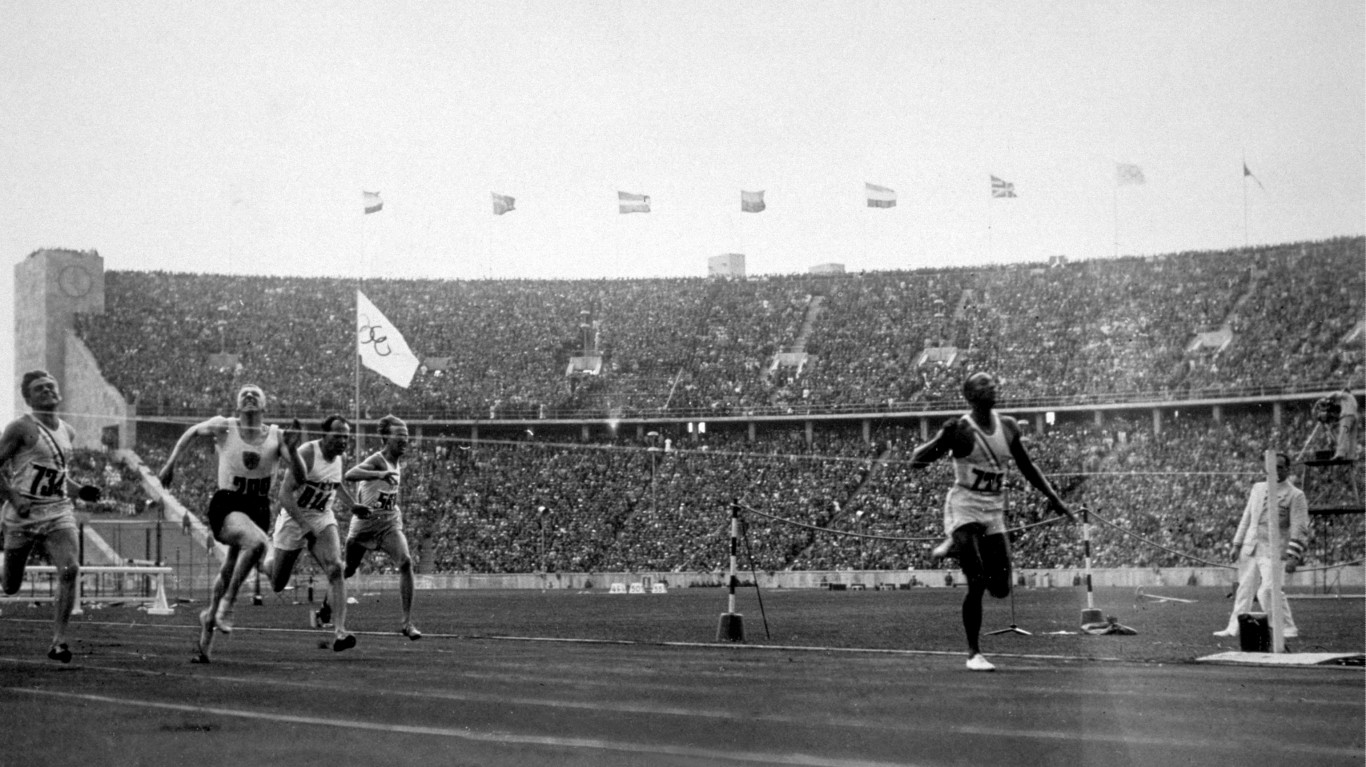
Owens would become the most successful athlete at the Berlin 1936 games by winning four gold medals in the spring and long jump events. His time in the limelight occurred during his participation in the 100-meter race, long jump, 200-meter race, and 4 x 100-meter relay. As an African American, Owens was single-handedly credited with destroying Hilter’s idea of Aryan supremacy.
2. Civil Rights Protest
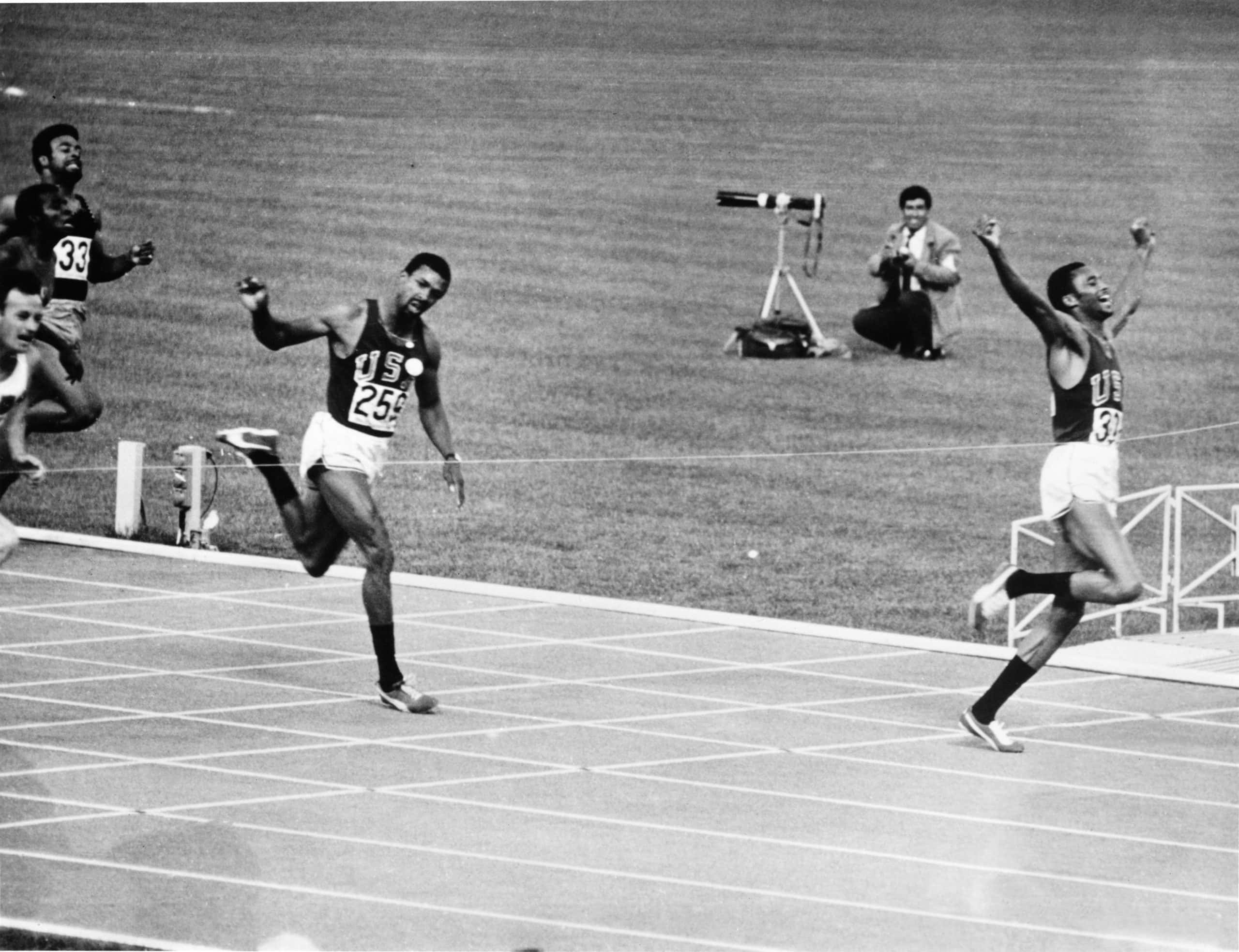
- Olympic games: Mexico City 1968 (XIX Olympiad)
As the Civil Rights movement was in full swing in America, African American participants from the US during the 1968 games in Mexico used it as an opportunity to protest racism. While many Black Americans were talked into boycotting the games, sprinters John Carlos and Tommie Smith staged nonviolent protests. They became instant icons with one of the most memorable photos in sports history.
Raised Fists
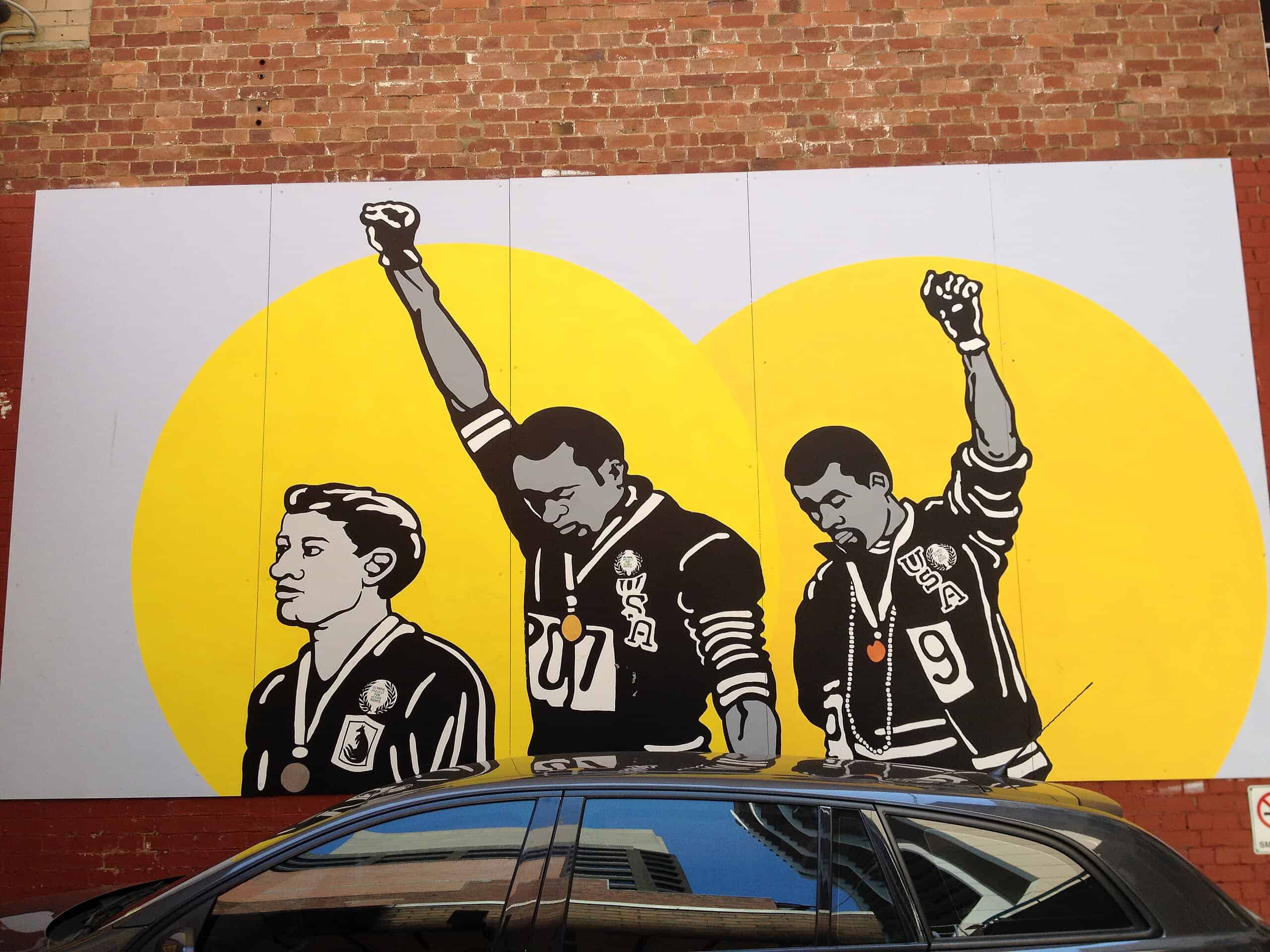
During the medal ceremony, when the two athletes received the gold and bronze medals, they raised their fists in protest instead of covering their chests while listening to the national anthem. As a result, the two athletes were banned from the Olympic Village. Still, their silent protest caught the attention of millions internationally and brought the matter of Civil Rights front and center.
3. Bob Beamon
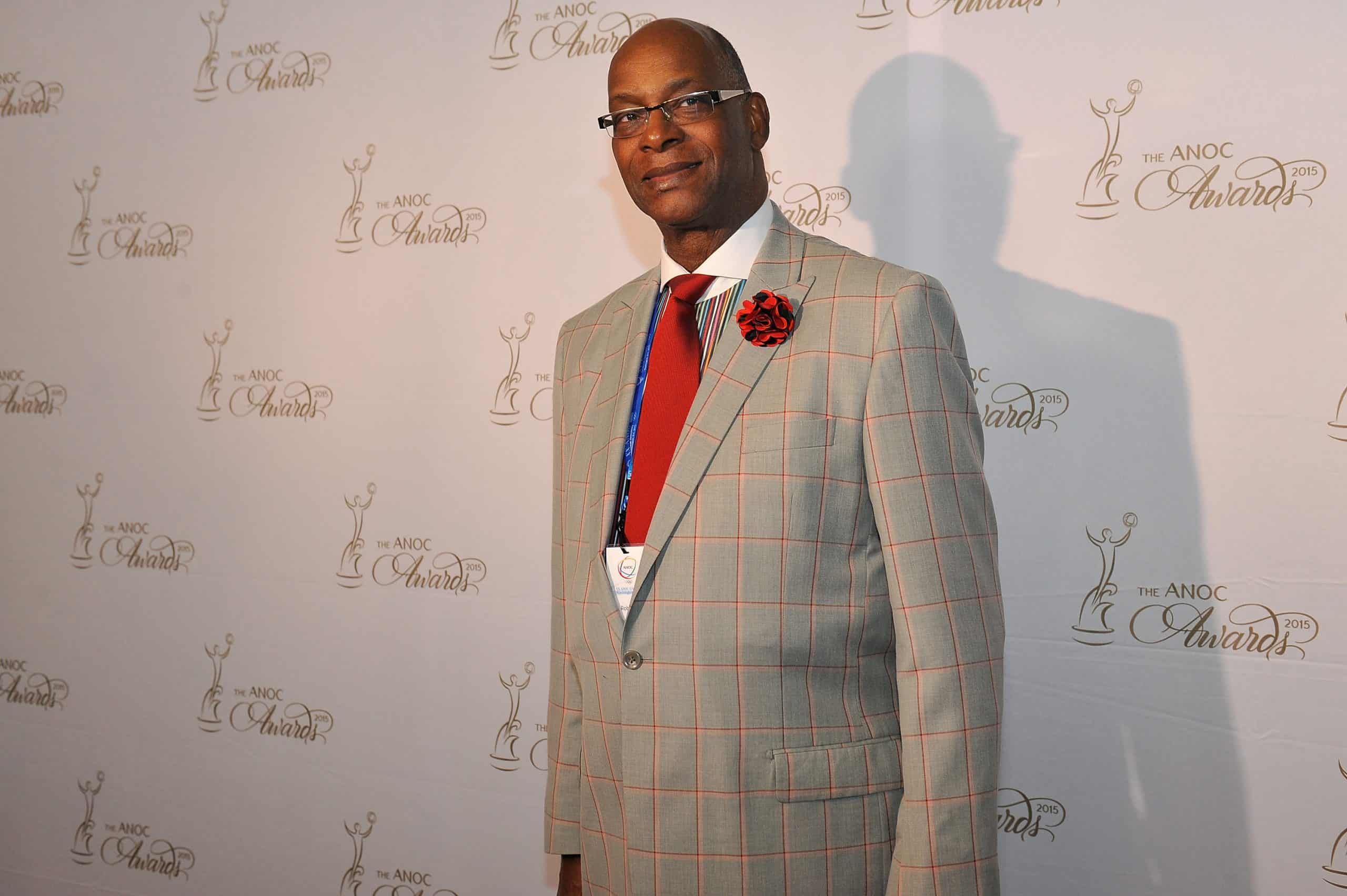
- Olympic games: Mexico City 1968 (XIX Olympiad)
While the 1968 Olympics might be best remembered for the Civil Rights movement, another record shattered everything the world knew about the long jump. American Bob Beamon was a heavy favorite at the event, but when he broke the world record in the long jump, his world record stood for another 23 years but still stands as the Olympic record.
Leaping Bob Beamon
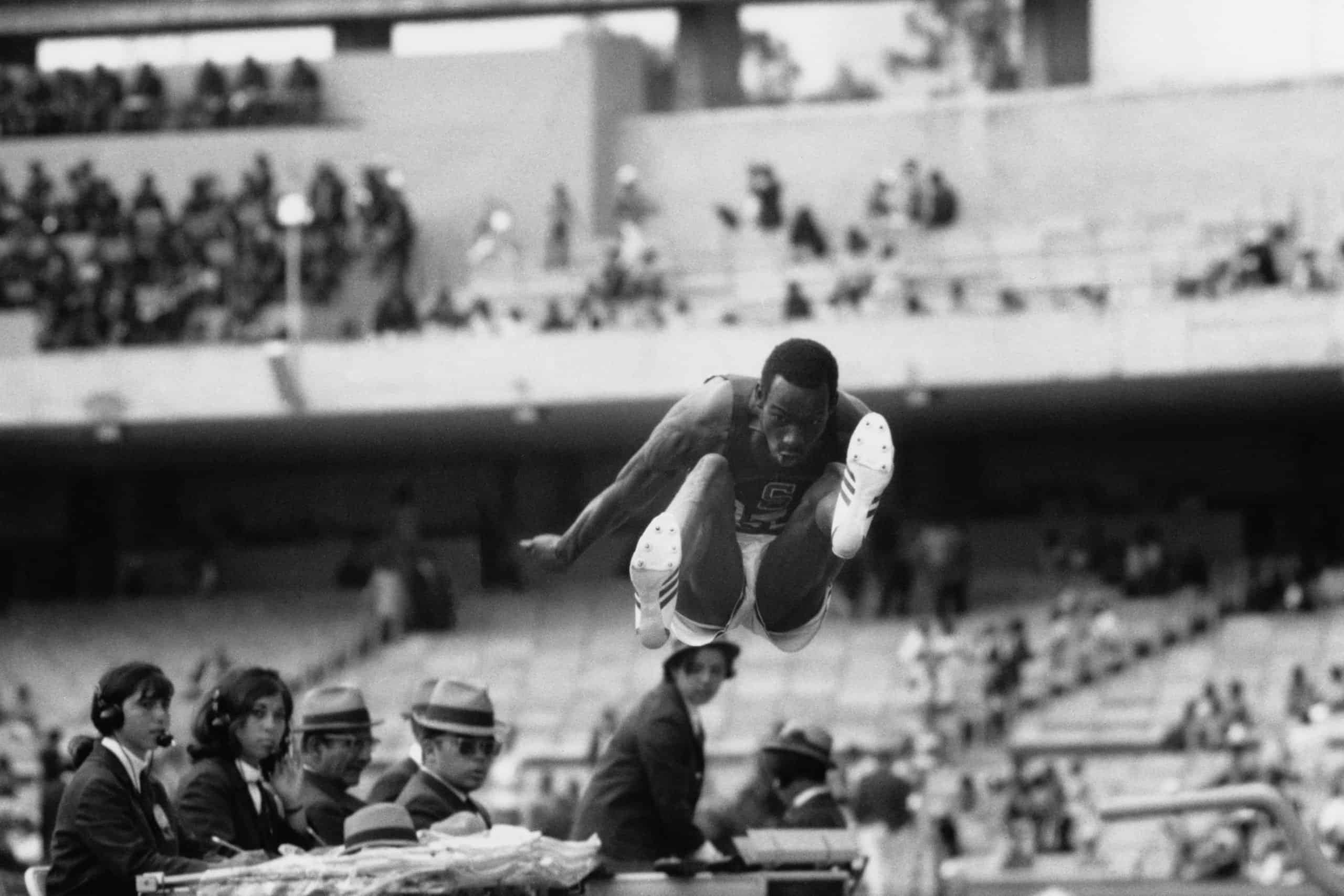
There are moments in athletic history when someone destroyed the existing record so badly that it’s almost unbelievable. This is what happened when Bob Beamon quite literally jumped into the history books. On his first jump, Beamon hit a record of 8.90 meters or 29 feet and 2.25 inches. Not only did Beamon better the record by 55cm, but the defending Olympic champion told him, “You have destroyed this event.”
4. Nadia Comaneci
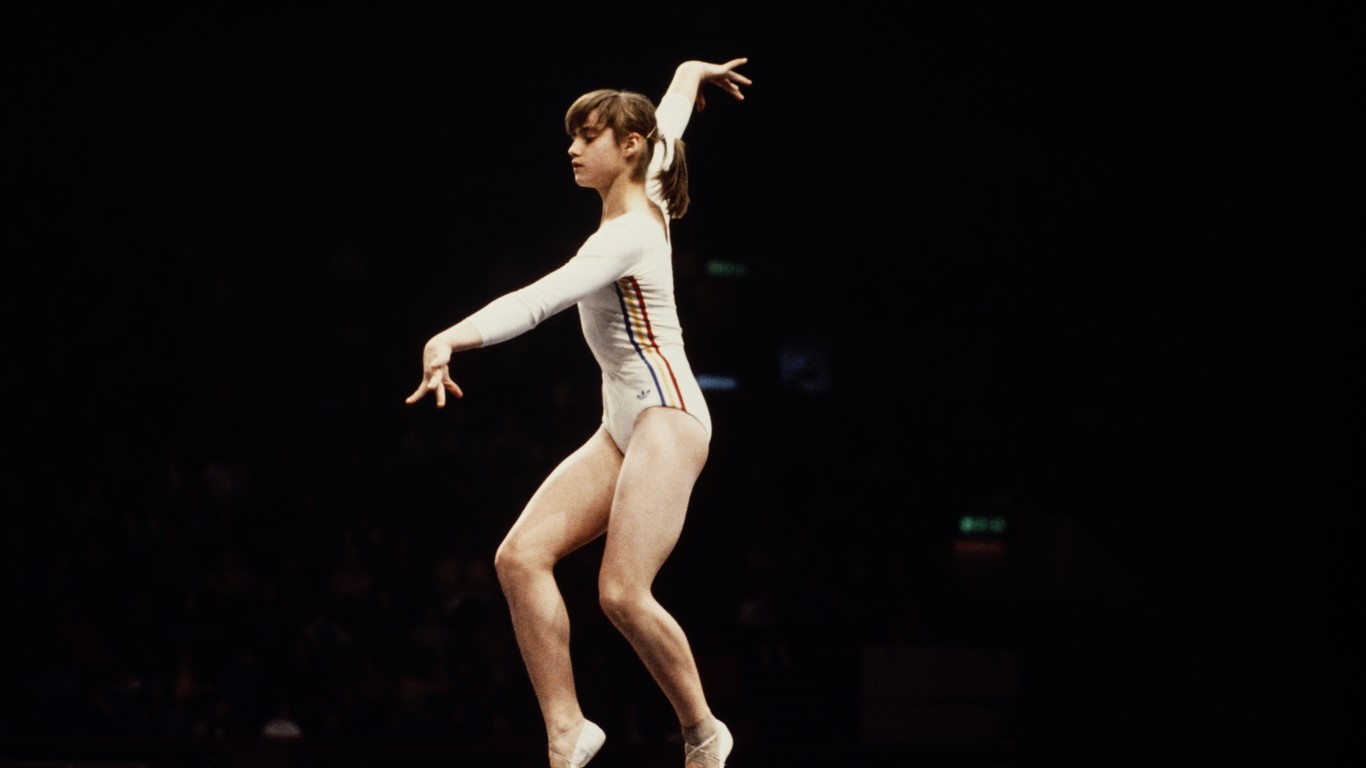
- Olympic games: Montreal 1976 (XXI Olympiad)
Long before Simone Biles dominated the world of gymnastics, there was Nadia Comaneci. Now a retired gymnast, the five-time Olympic gold medalist was the first gymnast ever to be awarded a perfect score of 10.0 at any Olympic games. Not only did Nadia receive one perfect ten at the 1976 Summer Olympics, but she also received six more to win three gold medals.
Perfect Score

At the time of the 1976 games, gymnastics was popular, but Nadia Comaneci was not a household name. Her fame was mainly in the gymnastics world, but she would do us all a favor by raising the sport’s profile globally. The whole world undoubtedly knew Nadia’s name after turning in a perfect ten on the uneven bars during the team event and then again on the beam later in the games.
5. The Dream Team
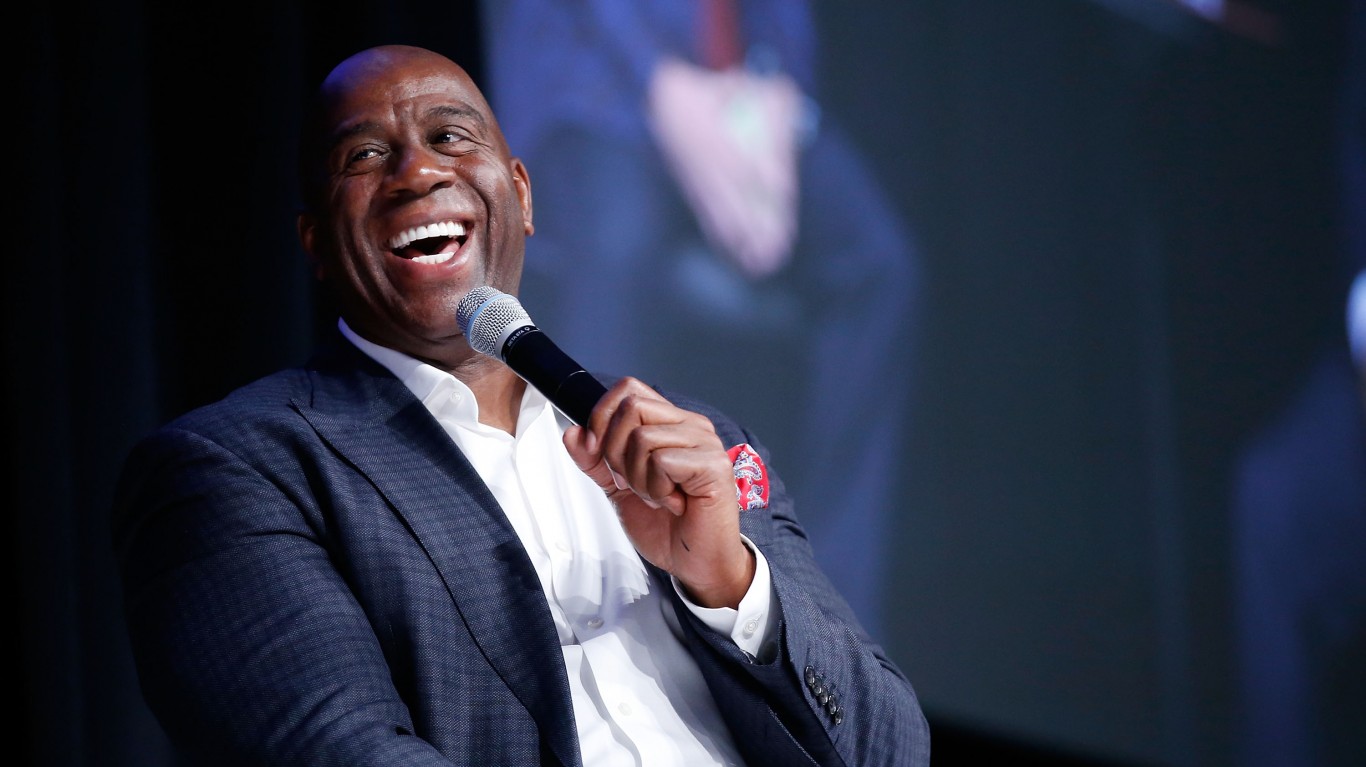
- Olympic year: Barcelona 1992 (XXV Olympiad)
For the first time in Olympic history, the men’s basketball portion of the tournament would allow professional players from the NBA. With this rule change, there is no question the United States took every advantage and assembled what is arguably the greatest sports team in history. After losing to Russia in 1988 and settling for bronze, the Americans returned victorious in 1992 and sealed America’s dominance for decades.
Michael Jordan Leads the Way
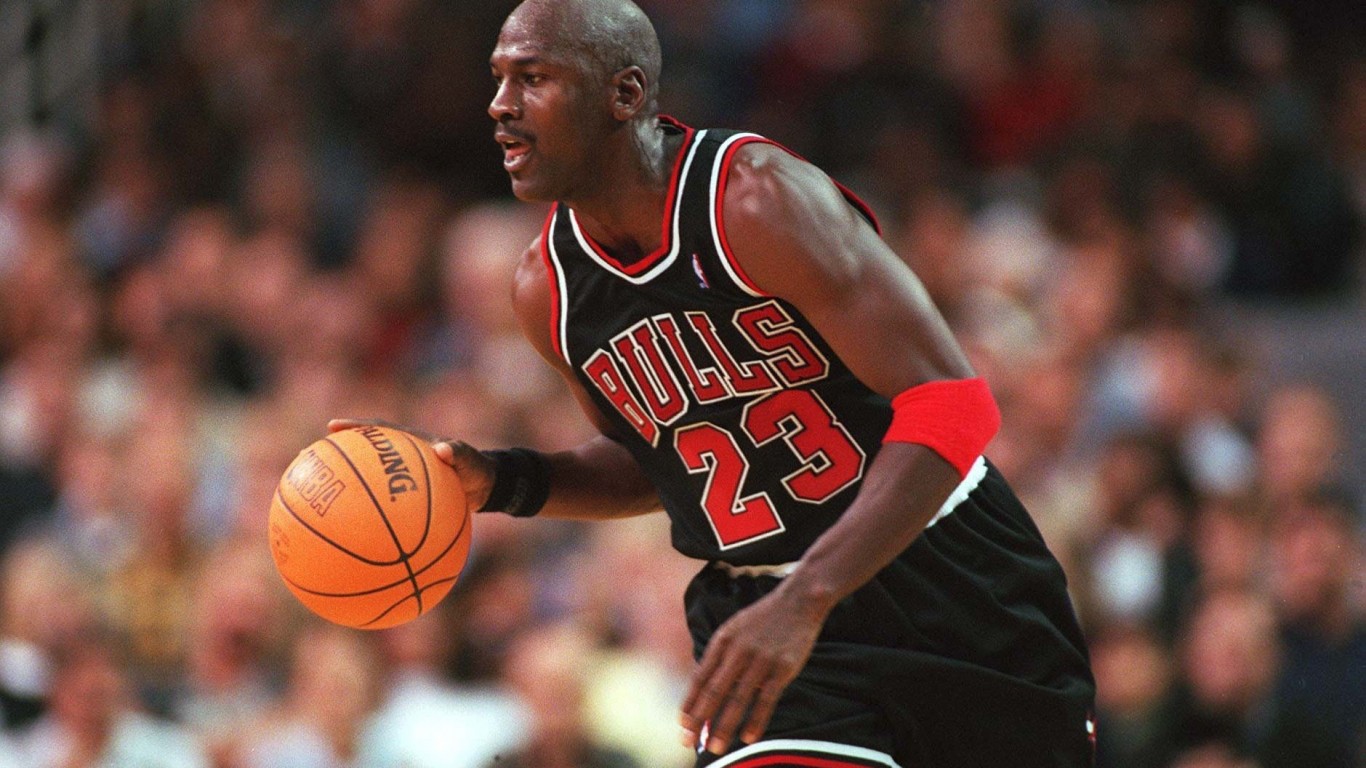
Led by Michael Jordan, Magic Johnson, and Larry Bird, the 1992 Dream Team basketball team didn’t just beat its opponents—it demolished them. The team defeated its opponents by an average of 44 points as it cruised to a gold medal. The team was so popular that it’s still the gold standard by which all NBA and professional teams are held today. Eleven players on the team have been inducted into the NBA Hall of Fame.
6. Kerri Strug
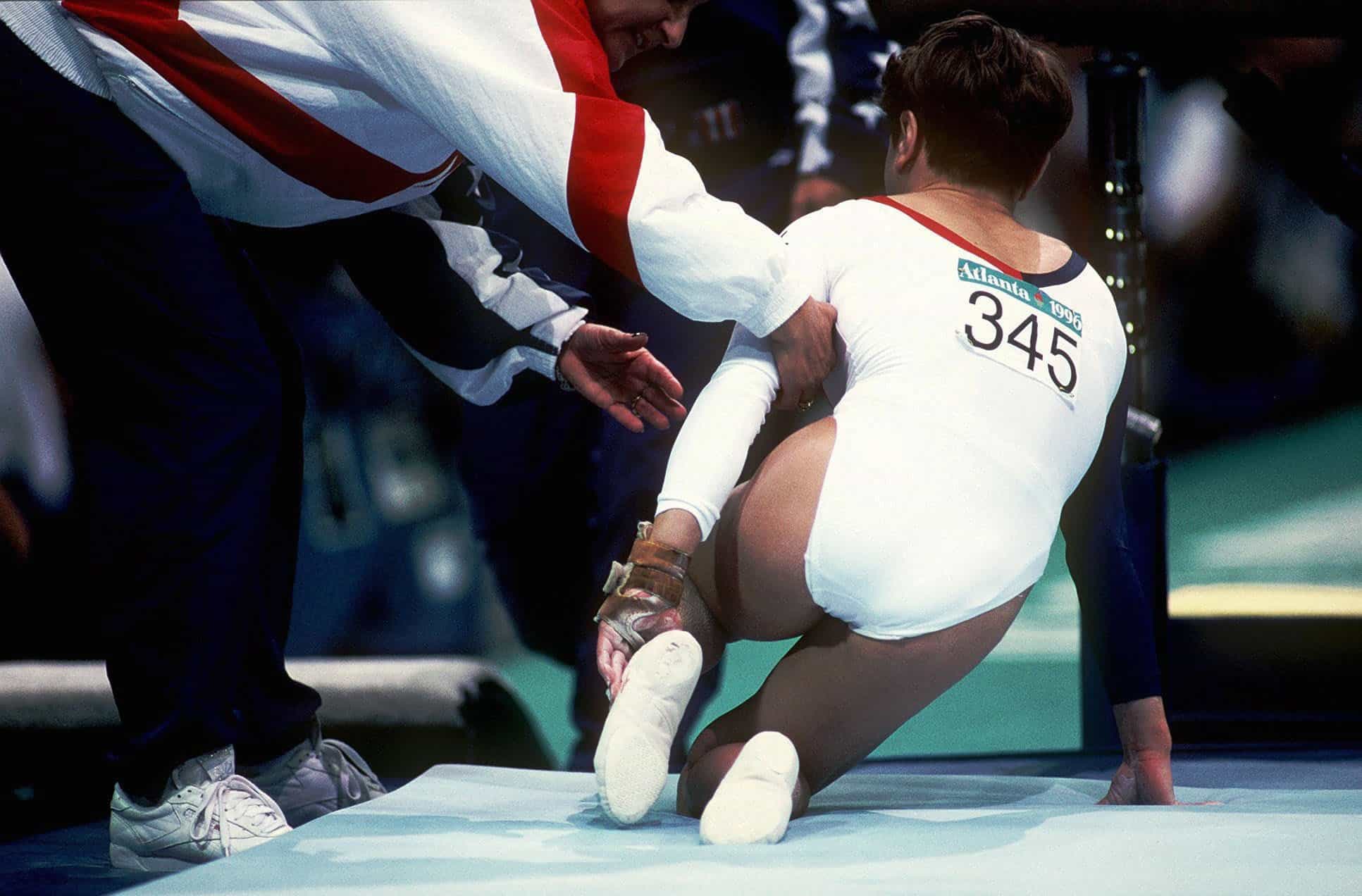
- Olympic year: Atlanta 1996
A member of the Magnificent Seven US gymnastics team during the 1992 Olympics, Kerri Strug set the American gymnastics world on fire by jumping into glory. As the US battled to take down the Russian team, which had long dominated the gymnastics world, Strug injured her ankle on her first vault attempt. However, Strug knew she had to go one more time to get the score the US needed to secure a victory.
Iconic Landing
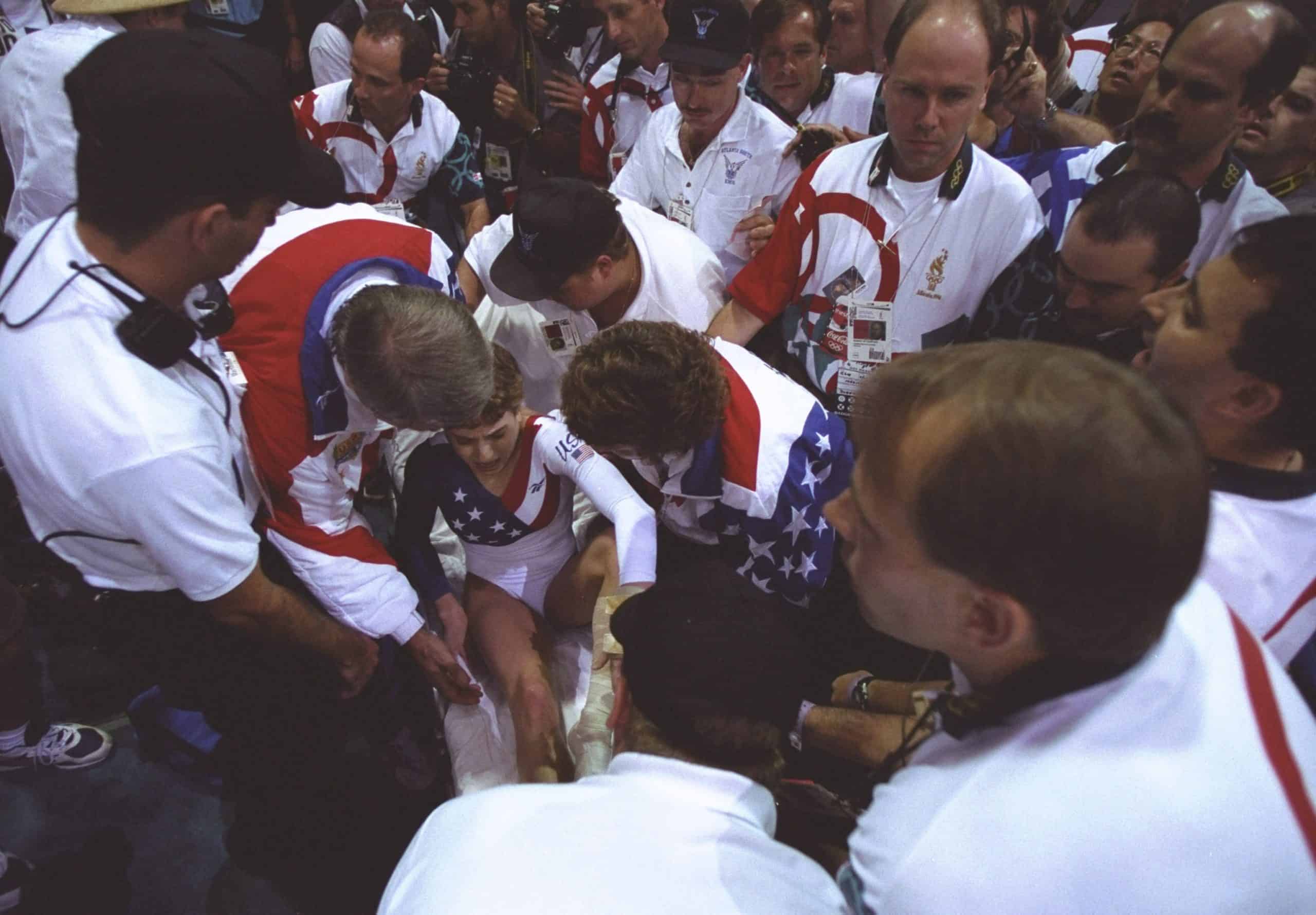
Going into the final rotation, the US team held a lead over the Russian team, but Russia could overtake if the US women failed to score big on the vault. On her first attempt, by over-rotating, Strug injured her ankle. After her injury, Strug asked her coach if she needed to perform again, which led to Strug limping back over to the runaway and making her second vault jump. While she landed brilliantly, Strug fell to the mat immediately and needed assistance to get up, but she had done enough to secure the gold medal for the American team.
7. Mark Spitz
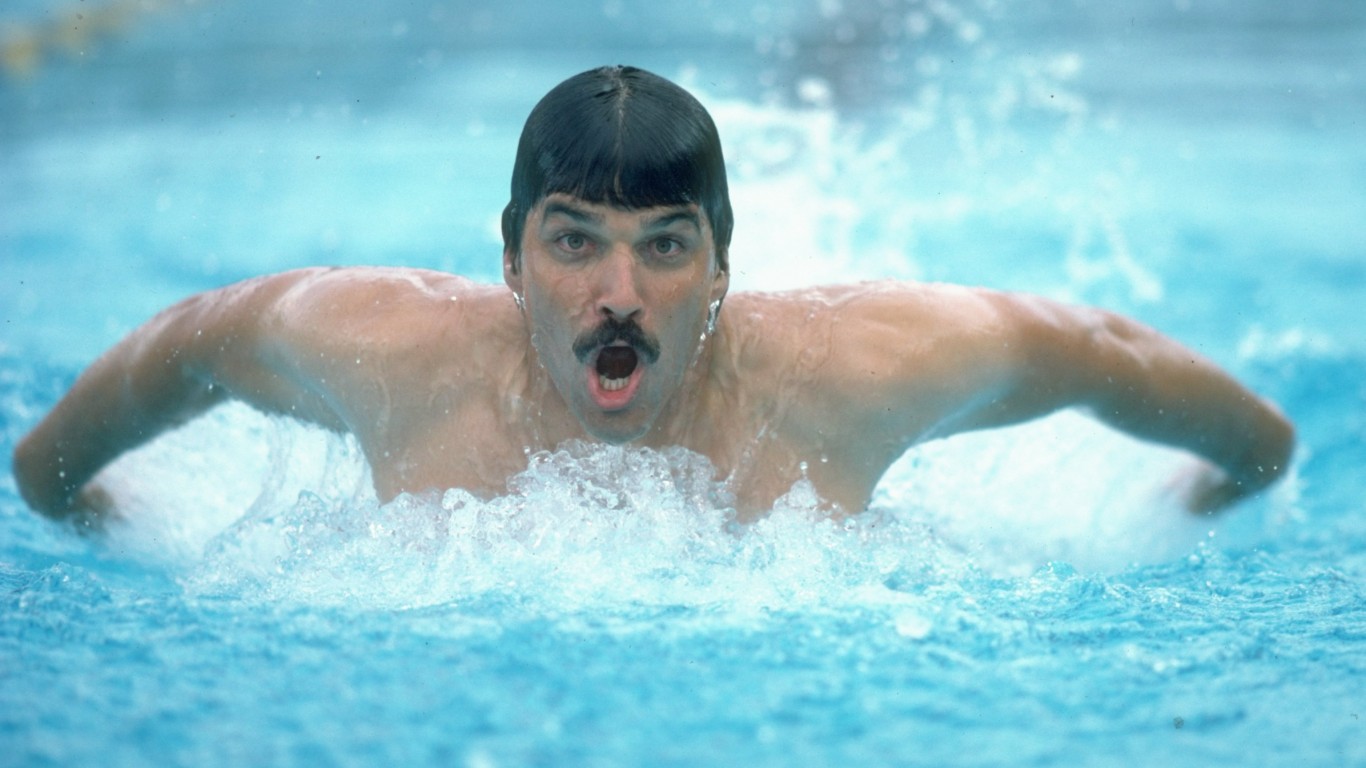
- Olympic year: Munich 1972 (XX Olympiad)
Still an iconic name in the sports world, Mark Spitz was the most successful athlete at the Summer Olympics for 36 years. After winning seven gold medals in 1972 in swimming, Spitz’s record looked like it might never be broken until another American, Michael Phelps, came along. During his time as a swimmer, Spitz set 35 separate world records.
Swimming to Glory
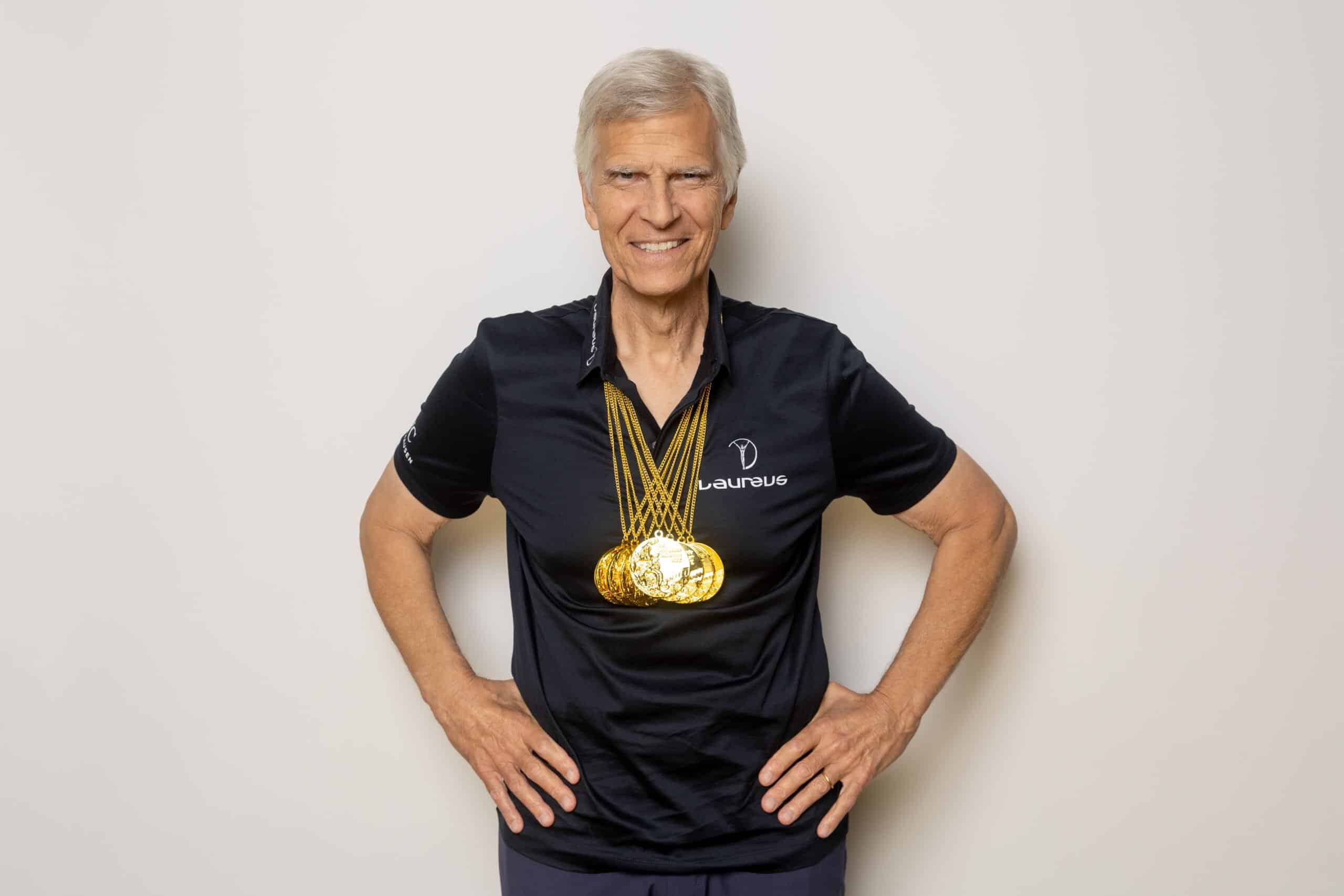
Looking to win six gold medals in 1972, Spitz entered his events as the 100-meter and 200-meter freestyle, 100-meter and 200-meter butterfly, 4×100-meter freestyle, 4×200 freestyle, and 4×100-meter medley relay. Spitz was perfect in every event and left on a high note as he retired from swimming after the games, even though he was only 22.
8. Miracle on Ice
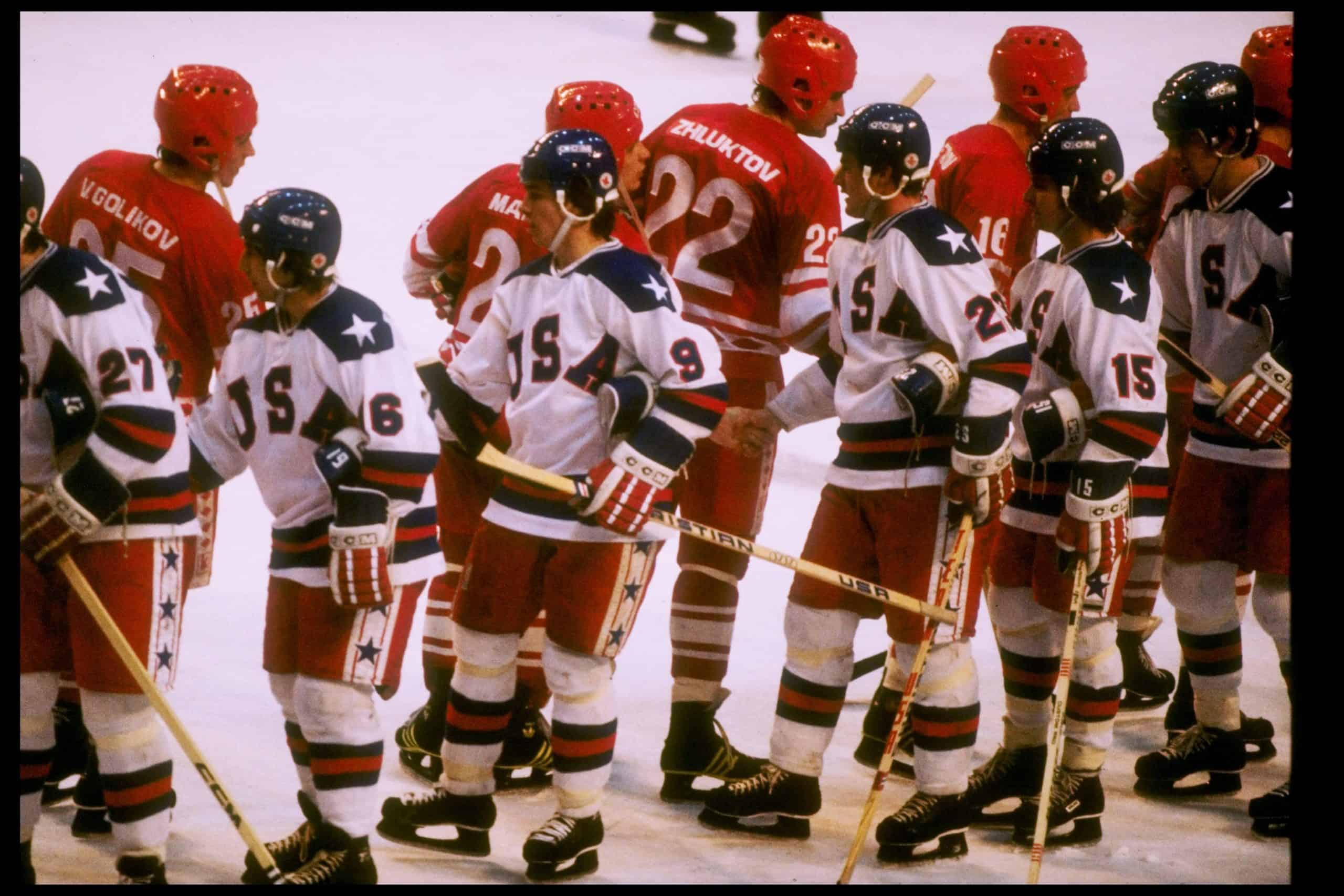
- Olympic year: Lake Placid 1980 (XIII Olympiad)
The hope is that the Olympics unite the world as you watch the best athletes perform at the highest level. Few sporting moments have united America more than the 1980 “Miracle on Ice” in Lake Placid, Utah, at the 1980 Olympics. Facing off against the Russian team that had beaten them time and time again, the men’s hockey team beat Russia 4-3 in the semi-final match.
National Pride

There is no question that the victory in this match was a source of national pride, which was capped off when the United States won the gold medal. After winning the gold medal in five of the last six Olympics, the Russian team was all but unbeatable. Playing with a team of amateurs against the Russian professional lineup, head coach Herb Brooks assembled the youngest team ever that made history.
9. Derek Redmond
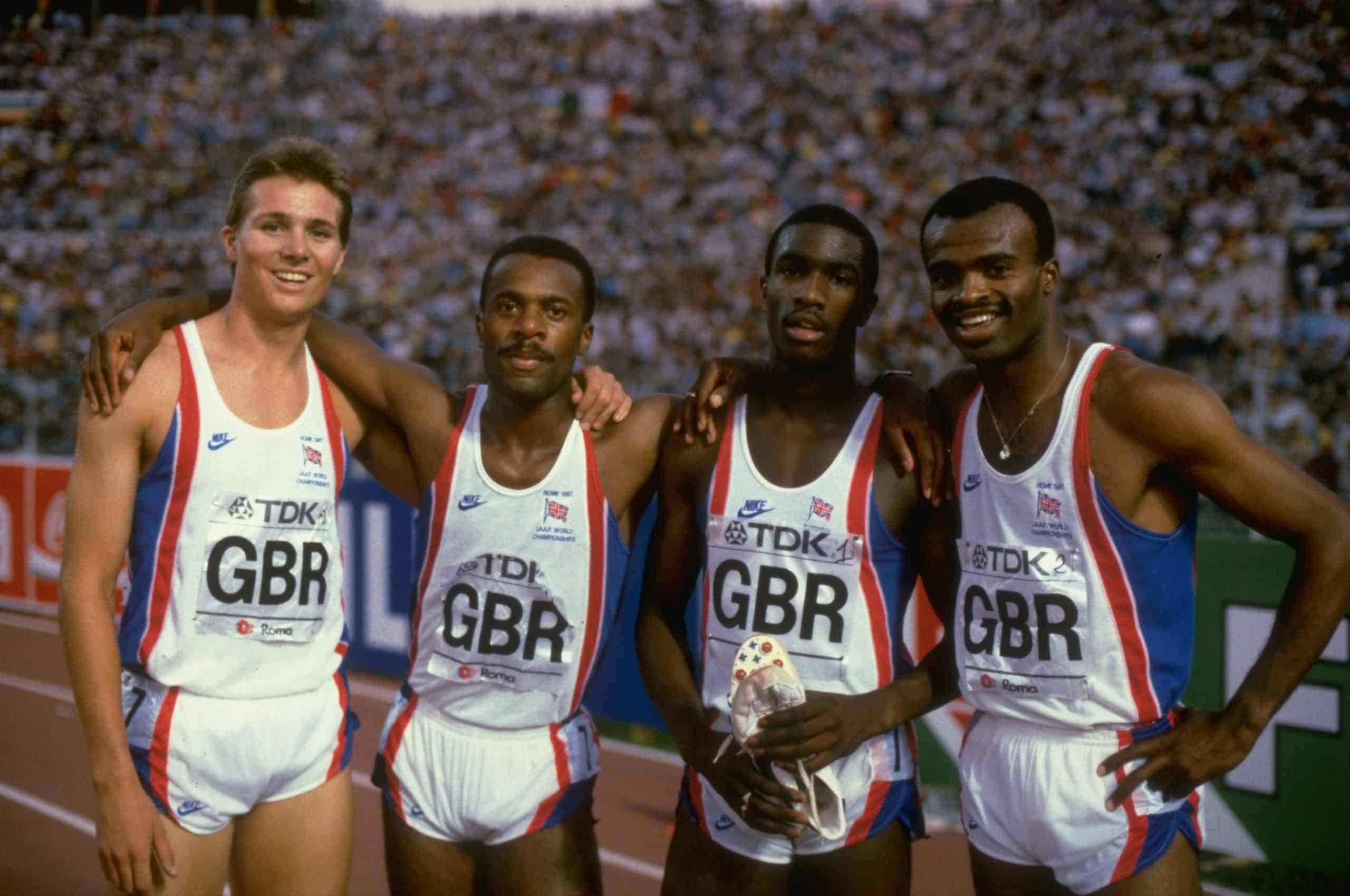
- Olympic year: Barcelona 1992 (XXV Olympiad)
Only a few moments in Olympic history are quite as emotional as Barcelona 1992 and Derek Redmond’s race in the 400-meter semi-final. One of the favorites in the race, Redmond tore his hamstring in the early stages but continued to limp down the track until his father appeared by his side and helped him finish the race.
The Crowd Cheer
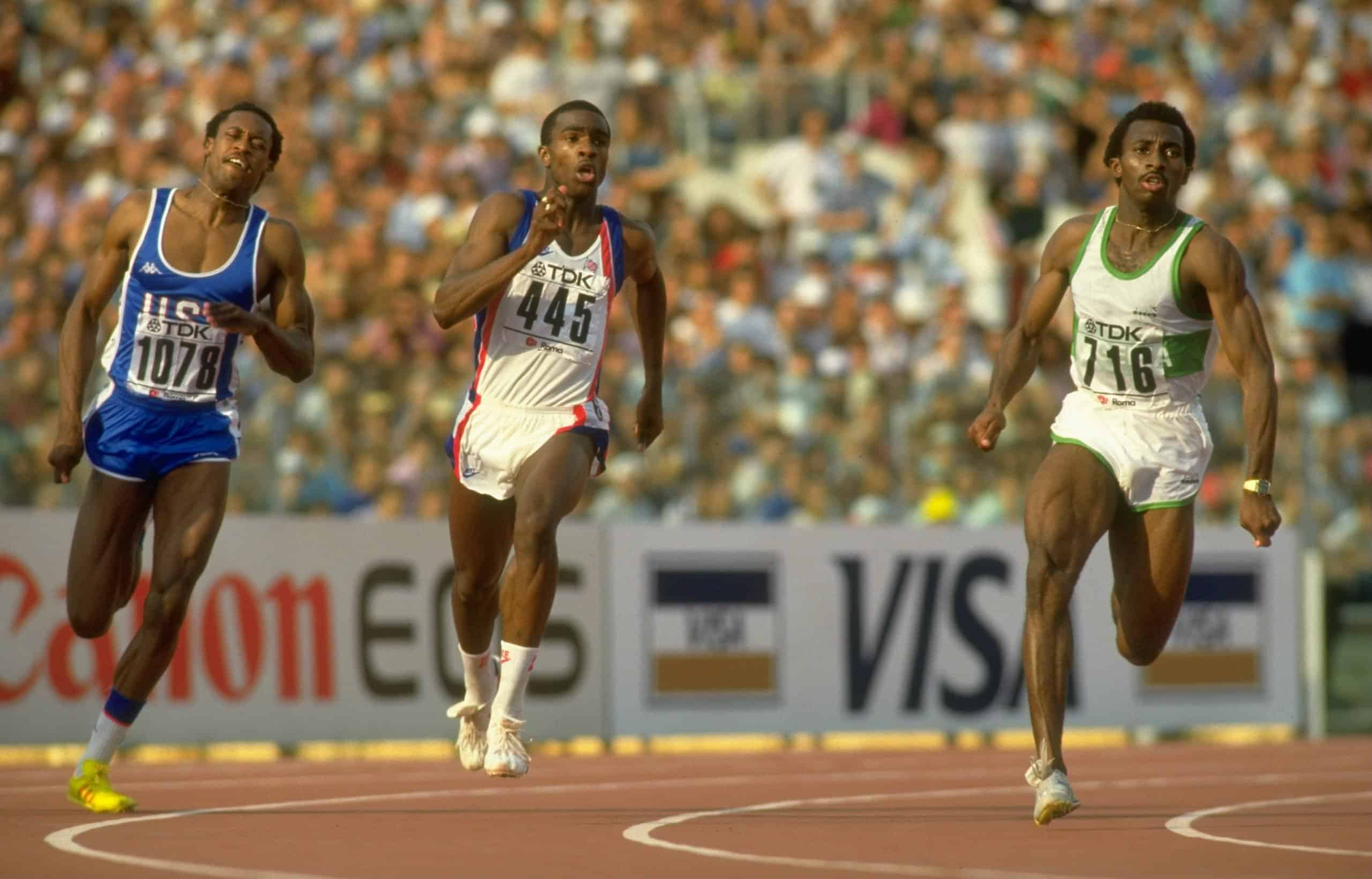
Some moments in Olympic history aren’t measured by medals but by the emotional moments we remember. Derek Redmond is one of these moments as his father, who brushed off officials as he made his way onto the track. While Redmond was unsurprisingly disqualified from the race, it didn’t matter. The crowd loved it both in person and those watching around the world.
10. Michael Johnson
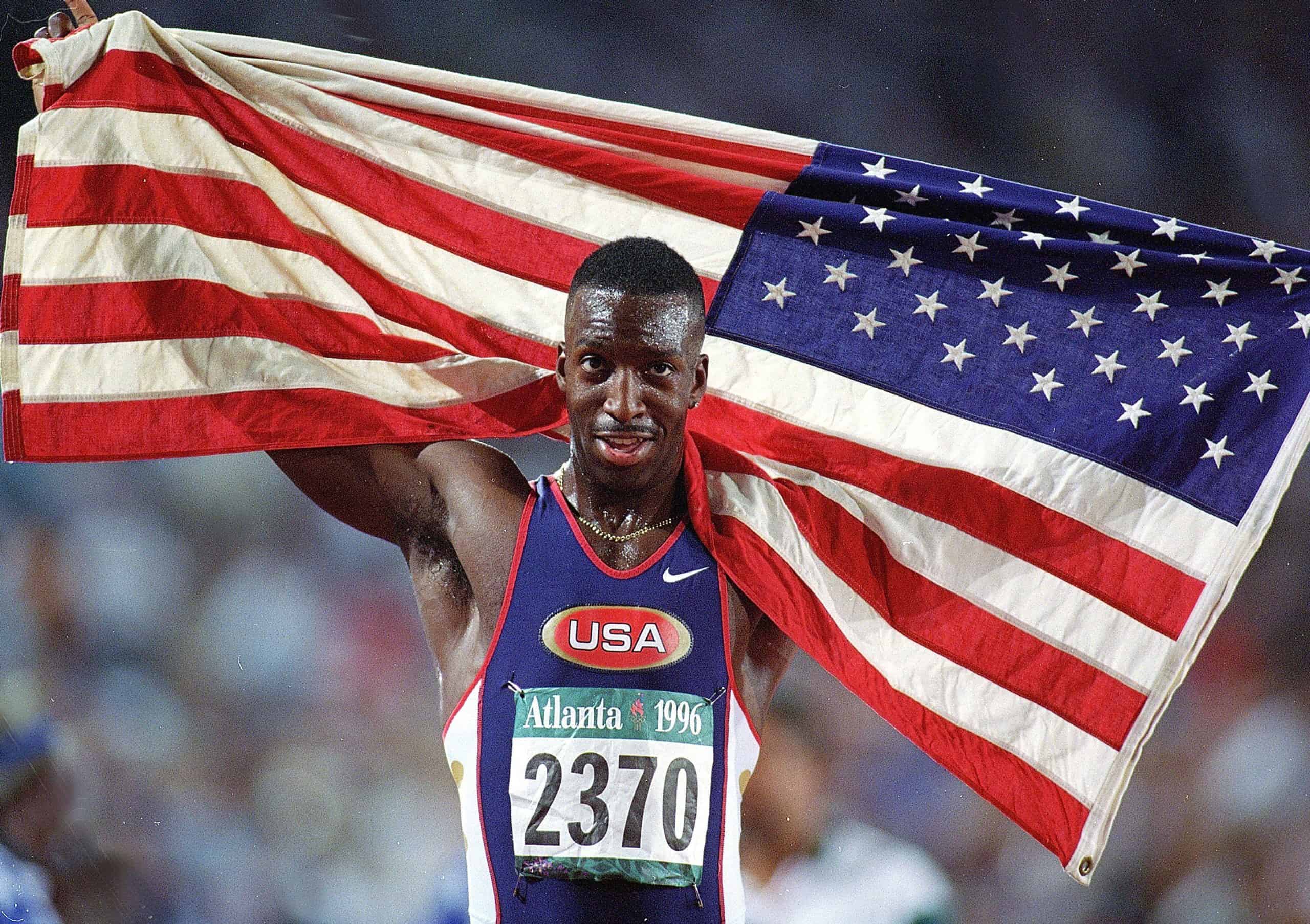
- Olympic year: Atlanta 1996
Twelve years before Usain Bolt became the most famous track star ever, Michael Johnson ruled the world. He was the king of track and field, the first man to win the 200m and 400m sprint races. The winner of four total Olympic gold medals, Johnson is widely regarded as one of the greatest and most consistent sprinters in the history of his sport.
Track and Field King
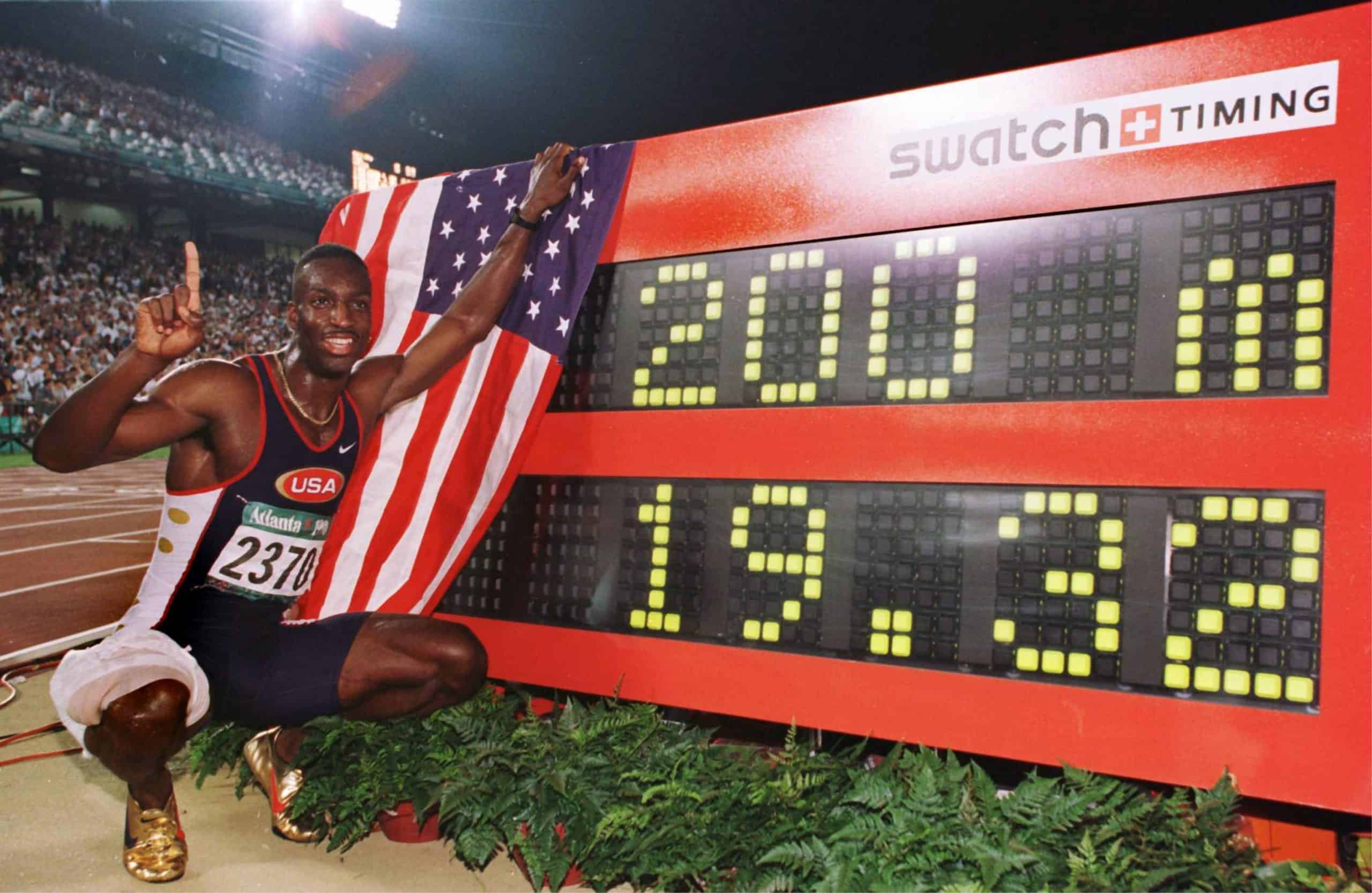
While Johnson’s efforts at the 1992 Olympic games made him a household name as a gold-medal relay team member, it would take another four years before he became a global sensation. Wearing his famous golden shoes, Johnson dominated the 1996 Olympics, winning gold in both of his best races. He would also win gold again in 2000 at the Sydney Olympics in 400m.
Thank you for reading! Have some feedback for us?
Contact the 24/7 Wall St. editorial team.

